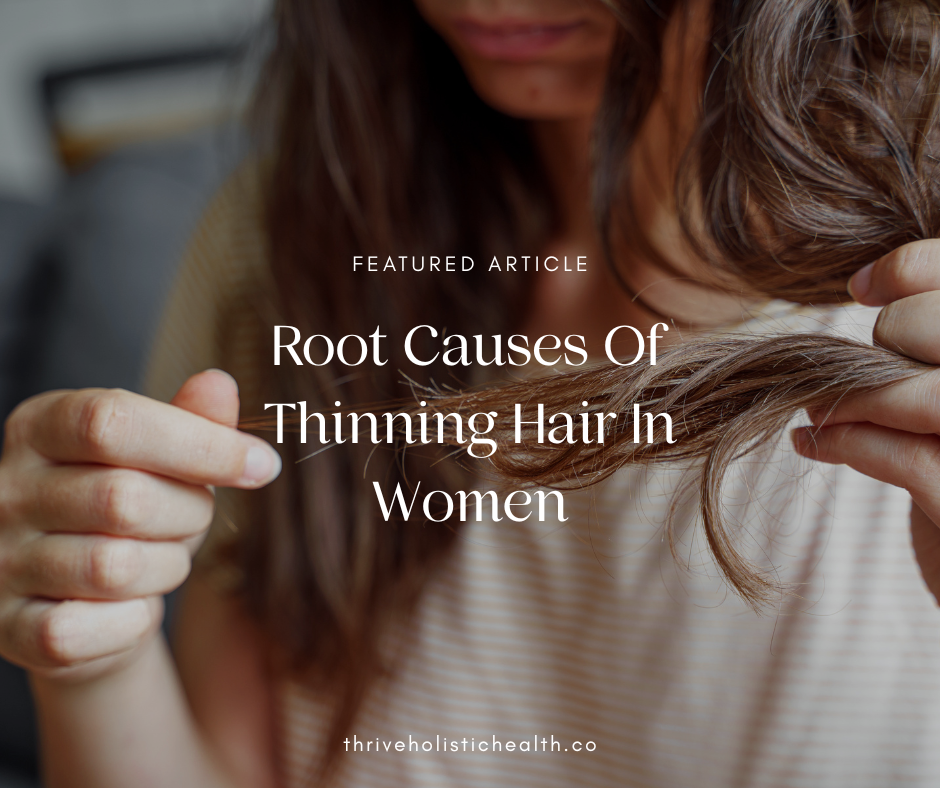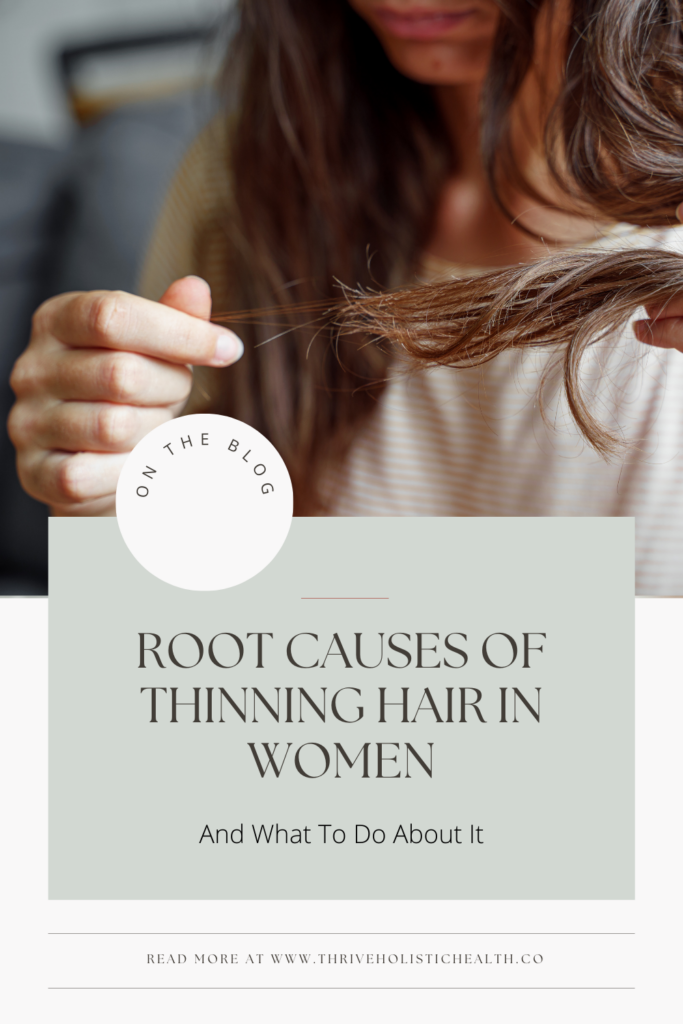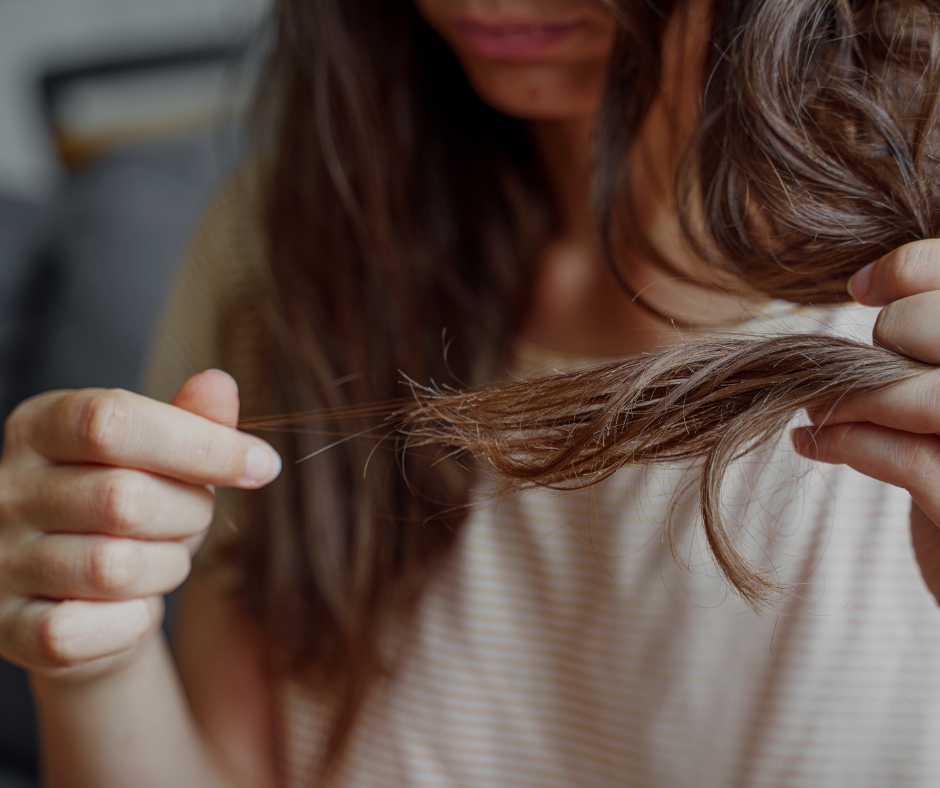
If your ponytail feels thinner, your part looks wider, or you find yourself collecting more hair in the shower than ever before—you’re not imagining it. Thinning hair is one of the most common concerns among women ages 35 to 55. But what many don’t realize is that hair thinning isn’t just a cosmetic issue; it’s often a clue from your body that something deeper is going on.
At Thrive Holistic Health, we address hair concerns through an integrative approach—combining internal root-cause healing through functional medicine with external support rooted in advanced cosmetology. That means we go beyond topical fixes to uncover what’s really happening in your body and your lifestyle that could be impacting your hair.
.
Root Causes of Hair Thinning in Women
1. Hormonal Fluctuations: Estrogen, Progesterone & DHT
Hormone shifts are one of the most common and often overlooked root causes of hair thinning in women—particularly during life transitions like perimenopause, menopause, and postpartum recovery.
Perimenopause & Menopause
As estrogen and progesterone begin to decline with age, hair can start to thin gradually. These hormones are naturally protective:
- Estrogen helps prolong the growth (anagen) phase of the hair cycle
- Progesterone calms inflammation and reduces the conversion of testosterone to DHT (dihydrotestosterone), a potent androgen that shrinks hair follicles
When these protective hormones drop, DHT can become relatively more dominant—even if testosterone levels haven’t changed. The result? Hair thinning across the scalp, especially around the temples and crown, in a pattern that can mimic male-pattern baldness, but is hormonally driven in a different way.
Postpartum Hair Loss
After pregnancy, women often experience a sharp decline in estrogen and progesterone levels. During pregnancy, elevated hormone levels help keep hair in the growth phase, leading to thicker, fuller hair. But once those hormones crash after birth—especially in the first few months postpartum—many women notice dramatic shedding.
From a functional medicine perspective, this is a normal process, but it can be worsened by:
- Nutrient depletion (iron, zinc, B vitamins, protein) from pregnancy and breastfeeding
- Sleep deprivation and cortisol imbalances, which impact hormone recovery and thyroid function
- Blood sugar swings or thyroid dysfunction that may develop or worsen post-birth
This shedding phase is usually temporary, but if the body doesn’t have what it needs to recover—nutritionally, hormonally, or metabolically—some women remain stuck in a prolonged telogen (shedding) phase instead of returning to active regrowth.
Supporting hormone balance, replenishing nutrients, and gently regulating stress are key to restoring healthy hair cycles after childbirth or during any major hormonal transition.
2. Thyroid Dysfunction
Your thyroid regulates the speed at which your body produces new cells, including those involved in hair growth. Even subtle dysfunction (low Free T3, or the presence of autoimmune antibodies like TPO/TG) can slow the hair growth cycle or lead to excessive shedding.
3. Nutrient Deficiencies
Hair is made of protein—specifically keratin—and relies on a wide range of nutrients for proper growth. Deficiencies or poor absorption of iron (ferritin), B12, zinc, biotin, vitamin D, omega-3s, and protein can all contribute to thinning or brittle hair.
At Thrive, we often uncover hidden nutrient deficiencies via functional labs—especially in women with digestive issues, chronic stress, or long-term dieting habits.
4. Stress and Cortisol Dysregulation
High or erratic cortisol (your stress hormone) shifts the body into survival mode. Blood is rerouted away from non-essential functions like hair growth. Chronically high cortisol also interferes with thyroid function and increases inflammation, further contributing to hair thinning.
5. Gut and Liver Health
A sluggish liver and an inflamed or dysbiotic gut can reduce your ability to detox excess hormones, absorb nutrients, and produce the raw materials your hair needs. We often see SIBO (small intestinal bacterial overgrowth), low stomach acid, or histamine issues in women with unexplained hair changes.
.
Labwork to Consider
Hair loss is often a symptom—not the root issue. At Thrive, functional lab testing is available when needed to help uncover the underlying factors contributing to hair thinning. Functional lab testing allows us to move beyond surface-level symptoms and uncover the deeper imbalances that may be disrupting your hair growth cycle.
By assessing your hormones, nutrient status, thyroid function, gut health, and inflammation markers, we’re able to identify the unique internal stressors contributing to your thinning hair. This allows us to create a personalized plan tailored to your biology—not a one-size-fits-all recommendation.
Depending on your symptoms and history, recommended labs may include:
Thyroid Panel: TSH, Free T3, Free T4, Reverse T3, TPO/TG antibodies
Why it matters:
Thyroid hormones directly affect the hair growth cycle. When levels are imbalanced—especially when Free T3 is low or Reverse T3 is high—it can disrupt the anagen (growth) phase and lead to shedding or slowed regrowth.
What it can tell us:
Testing can reveal whether your thyroid is functioning optimally or struggling to support healthy metabolism at the cellular level. Low Free T3 or high Reverse T3 may point to sluggish metabolism, which often shows up first in fast-growing tissues like hair. Elevated TSH could suggest an underactive thyroid (hypothyroidism), while the presence of TPO or TG antibodies may indicate autoimmune thyroid disease, such as Hashimoto’s—a frequently overlooked cause of hair thinning in women.
Sex Hormones: Estradiol, Progesterone, DHEA-S, Free & Total Testosterone
Why it matters:
Sex hormones help regulate the hair follicle environment. Imbalances—especially high androgens or low estrogen/progesterone—can shrink hair follicles, slow growth, or trigger shedding.
What it can tell us:
High levels of free testosterone or DHEA-S may signal increased conversion to DHT (dihydrotestosterone), a potent androgen associated with hair follicle miniaturization and thinning, especially around the crown and temples. Conversely, low estradiol and progesterone—common in perimenopause—can impair scalp circulation and reduce the follicular support these hormones normally provide. Hormone testing may also reveal patterns consistent with PCOS, adrenal dysregulation, or menopausal shifts that are silently influencing your hair.
Ferritin and Iron Panel (ideal ferritin for hair is 70-100 ng/mL)
Why it matters:
Ferritin is a marker of stored iron, and iron is essential for oxygenating hair follicles. Even “normal” levels that are too low can lead to shedding.
What it can tell us:
Low ferritin is one of the most common and underdiagnosed contributors to diffuse hair thinning in women, especially during menstruating years. A full iron panel—including serum iron, transferrin saturation, and TIBC—can also uncover absorption issues or deeper metabolic imbalances that may be limiting iron availability, even when dietary intake appears sufficient.
Vitamin D, B12, Zinc, and Omega-3 Index
Why they matter:
These nutrients support follicle strength, scalp health, and healthy inflammation levels. Deficiencies can impair keratin production, slow the growth cycle, or increase breakage and shedding.
What they can tell us:
Low vitamin D is frequently linked to autoimmune hair conditions and poor follicle regeneration. A B12 deficiency may interfere with red blood cell production and oxygen delivery to the scalp, especially in those following vegetarian or vegan diets. Zinc is crucial for keratin production and hair strand integrity, while a low Omega-3 Index reflects a pro-inflammatory internal state that can negatively impact the scalp environment and follicle health.
GI-MAP or Comprehensive Stool Test
Why it matters:
Gut health is central to nutrient absorption, inflammation, and immune signaling—all of which affect the hair.
What it can tell us:
A stool test may reveal imbalances such as dysbiosis, malabsorption, or low digestive enzyme output that could explain nutrient deficiencies despite a healthy diet. It may also uncover infections like H. pylori or parasites that interfere with iron and B12 absorption, or signs of leaky gut and intestinal inflammation, which create systemic stress that often shows up in the hair before anywhere else.
Hair Tissue Mineral Analysis (in some cases)
Why it matters:
This test can reflect long-term mineral imbalances or toxic metal exposure that might not show up in blood.
What it can tell us:
This test may identify toxic heavy metals like mercury that suppress mitochondrial and thyroid activity—both critical to hair growth. It can also shed light on chronic imbalances in minerals such as calcium and magnesium, which affect adrenal output and cortisol regulation, or the copper-to-zinc ratio, which is closely tied to estrogen metabolism and inflammatory load in the scalp.
At Thrive, we create custom lab panels based on your history and symptoms, and then walk you through the results in a clear, empowering way.
Biotin Is Not a Magic Bullet
While biotin is important for hair health, it’s rarely the root of the issue—and excess supplementation can skew thyroid and hormone labs. The key is to correct the specific nutrient gaps you have, not blindly supplement with trendy vitamins.
.
How to Support Hair Growth from the Inside Out
When it comes to thinning hair, most people jump straight to shampoos, serums, and scalp treatments—but what’s happening inside your body plays a far more significant role. Hair is a non-essential tissue, meaning the body only prioritizes its growth when everything else is balanced. That’s why optimizing your internal health is one of the most powerful ways to improve hair density, reduce shedding, and support long-term growth.
Let’s walk through some foundational strategies that support your hair at the cellular level—starting with nutrition.
Nourish Your Body, Fuel Your Follicles
Hair is made up of keratin, a protein that requires a steady supply of amino acids, vitamins, minerals, and healthy fats to grow. Without these raw materials, the hair cycle can become sluggish or stall altogether.
Here’s how to build a hair-friendly nutrition foundation:
- Prioritize protein.
Aim for 90–110 grams of protein per day to provide the essential amino acids your body needs to generate strong, healthy strands. If you’re under-eating protein, your body will direct those limited resources to critical functions first—not your hair.
- Focus on mineral-rich foods.
Zinc, iron, and omega-3s are particularly important for scalp health, inflammation balance, and follicle strength. Include foods like:- Pumpkin seeds and oysters (zinc)
- Grass-fed beef, lentils, and spinach (iron)
- Wild-caught salmon, walnuts, and flaxseed (omega-3s)
- Support hormone balance through detoxification.
Cruciferous vegetables like broccoli, Brussels sprouts, and cauliflower help your body metabolize excess estrogen, which can disrupt the hair cycle when out of balance—especially during perimenopause. Adding fiber-rich foods like chia seeds, sweet potatoes, and leafy greens also helps your body excrete waste hormones efficiently.
- Don’t forget hydration.
Hydrated cells = healthier tissue. Dehydration can contribute to dry, brittle hair and slow down the regeneration process. Aim for at least half your body weight in ounces of water daily, more if you’re active or it’s hot outside.
Supplementation: Targeted Support with Testing or Guidance
Even with a well-rounded diet, it can be challenging to obtain certain nutrients in therapeutic amounts—particularly in the presence of absorption issues, chronic stress, or increased physiological demand. In these cases, targeted supplementation may be beneficial. While testing can provide valuable insight, we also consider your symptoms, history, and preferences when determining the best course of action.
Common hair-supportive supplements include:
Iron (with ferritin monitoring).
If your ferritin is below 70 ng/mL, your body may not be storing enough iron to support hair growth. This is a very common root cause of thinning, especially in menstruating women.
Zinc and B-complex.
These nutrients support cell replication, scalp health, and hormone balance. Zinc is especially helpful for reducing shedding related to stress or inflammation.
Vitamin D3 with K2.
Low vitamin D is linked to hair loss, and most people don’t get enough sun exposure to maintain optimal levels year-round. The addition of K2 helps ensure proper calcium metabolism.
Omega-3 fatty acids.
Fish oil or algae-based omega-3s can help calm inflammation in the scalp and improve follicle resilience. They also support skin hydration and barrier function.
Adaptogens (like ashwagandha or rhodiola).
These herbs help regulate cortisol and support the adrenal system, which plays a key role in stress-related hair loss (like telogen effluvium).
Collagen peptides or marine collagen.
These provide specific amino acids—like glycine and proline—that help strengthen the hair shaft and support the connective tissues surrounding the follicle.
If you’re dealing with thinning hair, remember: it’s your body’s way of waving a red flag. Rather than chasing surface-level fixes, start by nourishing your inner terrain. At Thrive Holistic Health, we help you identify what’s missing and build a personalized plan that gets to the root—literally and figuratively.
.
External Solutions That Actually Work for Thinning Hair
While internal healing lays the foundation for healthy hair, what you put on your scalp and how you care for your hair daily matters too. External strategies can either support your growth efforts—or sabotage them. When done right, the right therapies and hair care products can enhance follicle function, reduce inflammation, and protect fragile strands.
Here are two powerful tools we integrate at Thrive Holistic Health to complement internal root cause healing:
Red Light Therapy for Scalp & Hair Regeneration
Red light therapy (RLT), also known as low-level laser therapy (LLLT), is one of the most promising non-invasive technologies for hair thinning—and it’s backed by science. Red and near-infrared wavelengths (typically between 630-850 nm) have been shown to penetrate the scalp and:
- Increase microcirculation and blood flow to the hair follicle
- Reduce inflammation and oxidative stress, both of which impair follicle activity
- Stimulate ATP (cellular energy) production, which helps “wake up” dormant follicles and encourage regrowth
This gentle, non-invasive therapy is particularly helpful for women experiencing diffuse thinning, stress-related shedding (telogen effluvium), or perimenopausal shifts. Many clients find that consistent use not only improves the look and feel of their hair but also helps maintain the health of their scalp long-term. At Thrive, we use a professional-grade, FDA-cleared device to deliver clinical results in a relaxing, holistic setting.
Why Clean, Functional Hair Care Matters
Most conventional hair products are loaded with synthetic fragrances, hormone-disrupting chemicals, and harsh detergents that can irritate the scalp, inflame hair follicles, and disrupt your skin microbiome. If you’re working on healing from the inside out, it only makes sense to reduce toxic burden from the outside in as well.
That’s why we choose to use Innersense Organic Beauty—a line of clean, professional-grade, high-performance hair care made with certified organic ingredients and sustainable packaging. From a functional medicine perspective, this is more than a beauty decision—it’s a therapeutic one.
Here’s why Innersense products are especially helpful for thinning hair:
- No hormone-disrupting chemicals like phthalates or parabens, which can interfere with estrogen balance and thyroid function
- Botanical-rich formulas that nourish the scalp and support natural hydration without buildup
- Non-toxic surfactants that cleanse gently without stripping the scalp or irritating hair follicles
- Essential oils and extracts that calm inflammation and support a healthy scalp environment
Choosing quality hair care helps reduce the stress placed on already-compromised follicles. It’s a small but powerful way to protect your progress and support regrowth over time.
Whether you’re addressing hormonal imbalances, nutritional deficiencies, or inflammation, external support can enhance and accelerate your results. We don’t just treat the hair—we support the whole person.
Ready to Take the Next Step?
If thinning hair has been holding you back, it’s time to explore a more personalized, root-cause approach. We combine functional testing, targeted nutrition, and therapeutic in-office care to support healthier hair from the inside out.
Here’s how you can begin:
- Book a Scalp Detox & Rejuvenation Session to deeply cleanse, hydrate, and stimulate your scalp
- Book a Hair & Scalp Red Light Session for focused, in-salon support
- Schedule a Functional Wellness Consultation if you’re ready for a customized plan based on your labs and symptoms
We’re here to help you take the guesswork out of hair loss and create a personalized strategy that actually works. To learn more about our in-office services—including scalp support and therapeutic treatments—feel free to reach out by phone or email. We’d be happy to answer your questions and help you take the next step.
.

Newer pOst
Last Post
more to explore
Functional Medicine Practitioner based in Grand Rapids, Michigan, helping people around the world restore balance, boost energy, and build resilient health.
